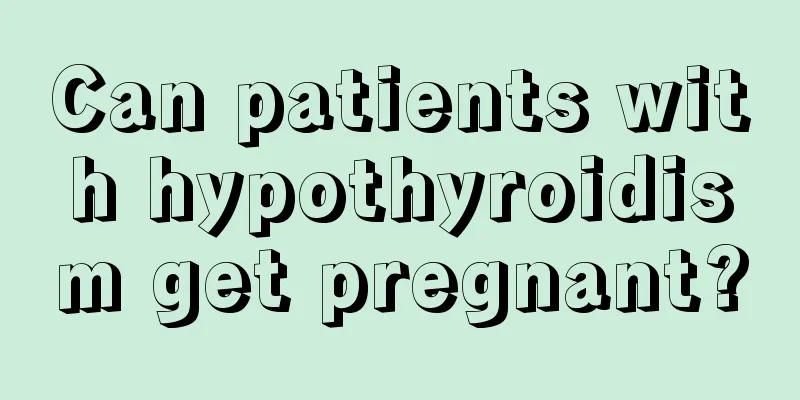Can patients with hypothyroidism get pregnant?

|
Everyone knows that the thyroid gland is a very important endocrine organ in the human body. However, when there is a problem with the thyroid gland, it will seriously affect the endocrine condition of a normal person. Hypothyroidism mainly refers to the decline of thyroid function, which has a greater impact on women's health because the decline of thyroid function can cause irregular menstruation and amenorrhea in women. Can patients with hypothyroidism still get pregnant? First of all, it needs to be made clear that hypothyroidism in women can cause chaos in the endocrine system. Women with hypothyroidism will experience symptoms such as excessive menstruation, amenorrhea, and infertility. Moreover, when women with hypothyroidism become pregnant, the incidence of miscarriage, stillbirth, and premature birth is higher than that of normal women. The miscarriage rate can be as high as 26%, and the incidence of premature birth is also very high, reaching about 15%. In addition, when a woman with hypothyroidism becomes pregnant, the chance of developing pregnancy-induced hypertension syndrome is about 10 times higher than that of a normal pregnancy. In short, whether it is in the preparation period for pregnancy or during pregnancy, the impact of female hypothyroidism on pregnancy is still very large. Although hypothyroidism has a great impact on women's pregnancy, the specific impact depends on the individual's condition. Generally speaking, mild hypothyroidism does not affect pregnancy in female patients. Such female patients can become pregnant under the guidance of a gynecologist, have prenatal checkups at any time, and have regular thyroid function tests. In fact, there are countless cases of such female patients giving birth to healthy babies, so patients do not need to worry too much. The impact on pregnancy for female patients with severe hypothyroidism is relatively large, because hypothyroidism is accompanied by symptoms such as anovulation, dysfunctional uterine bleeding, infrequent menstruation or amenorrhea. Therefore, the chance of pregnancy for these female patients is very low. Even if they become pregnant, the chance of abnormal pregnancy is also very high. This is the end of the introduction to the question of whether hypothyroidism in women will affect pregnancy. Hypothyroidism is a relatively harmful disease. It will affect the imbalance of multiple functions of the female body, especially affecting female fertility. Depending on the degree of development of the disease, the impact of hypothyroidism on female pregnancy will also vary. In short, if a woman suffers from hypothyroidism, she must have regular check-ups and active treatment to minimize the harm to pregnancy. |
<<: Nausea and vomiting after scraping
>>: How to squeeze Hami melon juice to make it tasty
Recommend
How is lymphoma contracted and what is the cause
The occurrence of lymphoma is related to multiple...
What are the dietary precautions for nephritis?
There are many things to pay attention to in the ...
What are the magical uses of chestnuts
Chestnuts are produced in large quantities in our...
How to treat nasopharyngeal carcinoma
How is nasopharyngeal cancer treated? 1. In recen...
Cervical spondylosis vertigo needs timely treatment
Nowadays, most people have cervical spondylosis, ...
Daily potassium supplement
Potassium is a trace element that regulates the a...
Causes of Lumbar Yangguan Pain
When it is cloudy and rainy, we sometimes feel ba...
What are the causes of lactic acidosis
Lactic acidosis is actually a complication of dia...
Hard contact lenses
Contact lenses are a common way of correcting vis...
The more common symptoms of pancreatic cancer include unexplained jaundice
The more common symptoms of pancreatic cancer inc...
The causes of sinus tachycardia are actually these
Studies have found that there are many causes of ...
Cost of biological immunotherapy for endometrial cancer
The incidence of endometrial cancer is getting hi...
The correct way to breathe while jogging
In life, many people often exercise by running, b...
Is a grade 1 placenta normal at 40 weeks?
As we all know, the pregnancy process generally l...
What are the benefits of roses
Rose is a kind of flower that many women love ver...









